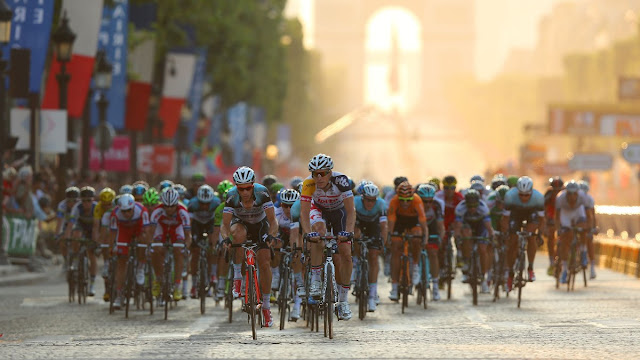There’s a move afoot to fix international bike racing before it’s too late.
- The economics of international cycling are brutal. At the beginning of each year, most teams have a set amount of money from sponsors—an assortment of companies paying to have their brand draped across the scrawny torsos of panting riders. The big players—bike makers, telecoms and even fossil fuel companies—are usually Europe-based, given the sport’s high profile there.
- Teams burn through the money, spending it largely on payroll, equipment and travel. As each season winds down, the race to secure funding for the next one begins.
- Last Sunday, the Tour de France ended as it does every year, amid crowds of cheering Parisians, fans and tourists who line the Champs-Élysées. For some, however, the race still evokes unpleasant memories of seemingly endless doping scandals, culminating in the disgrace of American rider Lance Armstrong.
- While the sport has sought to put those days behind it, in some ways its structural problems are a bigger crisis.
- Cycling is a difficult sport to sell to broadcasters, with hours of relative inaction interspersed with short moments of excitement when a rider tries to move up (attacks) or crashes.
- Most cycling broadcasts—even for the Tour de France—lose money.
- With budgets that range from $15 million to as much as $40 million, keeping the teams afloat is hard in the best of circumstances.
- There are the lucky teams who benefit from the backing of a big company or billionaire. Bernal’s team, Team Ineos is backed by British petrochemical company Ineos. CEO Jim Ratcliffe, ranked No. 55 on Bloomberg's Billionaire Index with a net worth of $18.8 billion.
- The difference between teams forced to scrounge for sponsors and those swimming in cash shows on the race course. Team Ineos (formerly Team Sky when its chief sponsor was Sky UK) has dominated the biggest stage races of the past decade, winning seven of the past eight Tours de France.
- This instability of professional cycling has been compounded by another structural oddity: Teams aren’t permanent franchises.
- The UCI has said it’s planning to change how this all works. For next season, a new structure for men’s cycling is envisioned, one that will address some of the thornier issues confronting second-tier teams. A key reform will be the extension of team licensing to three years, the UCI announced in December. (The UCI did not respond to a request for comment.)
- Another helpful development has been the increased number of sponsors moving into ownership roles.
- Cycling has started experimenting with new tactics to attract fans.
- Capitalizing on firsthand content is also the strategy of Velon, a company created by 11 of the top cycling teams. Part union, part data company and part incubator, Velon is working to loosen the iron grip of race organizers.
References:
Bloomberg, The Fight to Save Professional Cycling From Itself, Josh Petri, August 1, 2019.

No hay comentarios.:
Publicar un comentario
Bienvenidos todos los comentarios respetuosos.